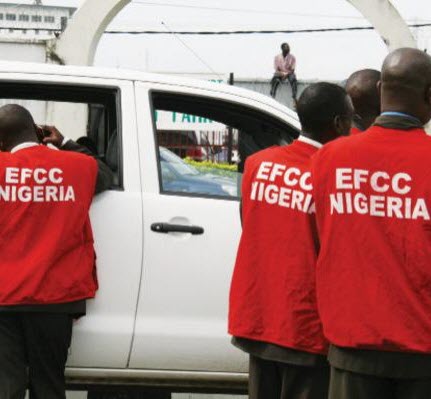There are no products in your shopping cart.
| 0 Items | £0.00 |

 SENATORS have began the process of decoupling the Economic and Financial Crimes Commission (EFCC) from the Nigeria Financial Intelligence Unit (NFIU) in order to get the country's suspension from the international anti-graft watchdog the Egmont Group lifted.
SENATORS have began the process of decoupling the Economic and Financial Crimes Commission (EFCC) from the Nigeria Financial Intelligence Unit (NFIU) in order to get the country's suspension from the international anti-graft watchdog the Egmont Group lifted.
Earlier this week, the Egmont Group, a network of 152 financial intelligence units across the world suspended Nigeria's membership over political interference in the war against corruption. Nigeria's NFIU is a member of the association and the EFCC, which is one of its arms is charged with combating corruption but Egmont has become exasperated with political interference in its activities.
In a bid to avert Nigeria's expulsion from the Egmont Group, the Senate began processes that would grant legal, operational and financial autonomy to the NFIU, leading to its decoupling from the EFCC. Senators have also the acting EFCC chairman Ibrahim Magu, of contributing to Nigeria’s recent suspension from the group by his interference in the operations and staffing of the NFIU, despite claims that the unit was autonomous.
According to senators, Mr Magu’s meddlesomeness has led to the exit of many competent hands from the NFIU. Yesterday, the senate directed its committee on anti-corruption and financial crimes to prepare and submit a draft bill for the enactment of a law that would create a substantive and autonomous NFIU, which it is expected to submit in four weeks time.
Nigeria was fully admitted into the Egmont Group in 2007, after operational admittance in 2005, in what was considered one of the biggest achievements of the Olusegun Obasanjo administration. It provides a platform for sharing criminal intelligence and financial information bordering on money laundering, terrorism financing, proliferation of arms, corruption, financial crimes, economic crimes and similar offences geared towards the support of local and international investigations, prosecutions and assets recovery.
Some of the agencies that benefit from the activities of the group include the Central Bank of Nigeria, Nigerian Customs Service, the Independent Corrupt Practices and Related Offences Commission, the EFCC, the Nigeria Immigration Service, Federal Inland Revenue Service and the Securities and Exchange Commission. Nigeria's membership of the Egmont Group paved the path for the removal of local banks from the blacklist of international finance.
This blacklisting had prevented the banks from engaging in correspondent banking with foreign institutions and also denied Nigerians access to foreign credit cards. The NFIU, which represents Nigeria in the Egmont Group, was suspended at its July 2017 meeting in China, following the country's failure to grant operational autonomy to the financial intelligence unit, a situation which the group has objected to for years.
Nigeria was also accused of divulging confidential information and constant leakage of sensitive intelligence to the Nigerian media, contrary to global best practices the country signed up for. The group also issued a December 2017 ultimatum to Nigeria to address the issues that led to the suspension or be expelled, which will attract international sanctions against Nigeria’s financial system.